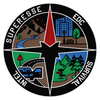TAKE COURSES THAT MATTER
In order to be better prepared for a life altering event (LAE); training courses, practical exercises, and planning should be conducted. While this is not an exhaustive summary, these topical classes should provide an intermediary introduction to being ready for a worst case scenario.
First Aid and CPR: Knowing how to provide basic first aid and perform CPR can be crucial in emergency situations. Courses on these topics are often offered by organizations such as the American Red Cross and the American Heart Association. Keep a copy of a quick reference card or booklet in your preps (consider of Worst-Case-Scenario First-Aid Guide)
Wilderness Survival: For those preparing for scenarios in which they may need to survive in the wilderness, courses in wilderness survival skills can be helpful. The National Outdoor Leadership School (NOLS), Pathfinder School, and Nature Reliance are organizations that offer courses in wilderness medicine, navigation, and other survival skills.
Self-Defense: In a LAE scenario, self-defense may be necessary to protect oneself and loved ones. Training in martial arts such as Brazilian Jiu-Jitsu (BJJ), Krav Maga, and others may be helpful in such situations.
Food/Water/Utilities/Supplies: Learn how to grow, collect, and preserve/store food and water. Courses (to include online research) on canning, dehydrating, rainwater collection, and water purification/filtering should be taken. Take steps to sustain basic needs related to heating, charging essential electronics (solar panels & battery bank), collecting/storing fuel, medical requirements, etc.
Gun Safety and Marksmanship: For those planning to use firearms for self-defense, training in gun safety and marksmanship is important. Courses offered by organizations such as the National Rifle Association can be helpful in this regard but finding a local, well-vetted instructor will offer more diverse and real-world training.
Emergency Preparedness: Courses on emergency preparedness can cover topics such as water purification, shelter construction, and emergency communication. Fieldcraft Survival offers specific training on emergency, self-defense, and self-sufficiency education.
Communications: In a LAE scenario, communication may be difficult due to infrastructure damage or cyberattacks. Learning how to use radios and other communication devices, as well as how to send and receive messages in Morse code, can be valuable skills. It is also important to have a plan for keeping cellphones charged and protected from electromagnetic pulse (EMP) attacks. This can include keeping the phone in a Faraday cage or bag, and having a portable power bank or solar charger to keep the phone charged. Take ham radio courses (they are online or at many fire departments) then get your certification. Also, research and seek out other comms classes (we wrote a guide on this). Comms goes beyond just radio and cellphones; learn about satellite phones, mesh networks, encrypted messaging apps, etc.
Mobility: In some scenarios, it may be necessary to quickly evacuate an area or travel long distances on foot or by bike or even on a motorcycle. Courses on land-navigation, orienteering, and vehicle-maintenance, and off-roading can be helpful in this regard (consider our Bugout Vehicle Reference Guide). Learning how to drive and maintain your personally owned vehicle (POV) along with outfitting it for an emergency or egress is vital. Have printed maps and routes planned for both on foot and by-vehicle travel.
It is important to note that certifications and trainings alone are not sufficient to be fully prepared for a LAE scenario. You should also have a comprehensive plan in place that is reviewed with partnered households (family/friends). Learn, train, practice, drill, and evolve with developing events.
Take courses and achieve certifications to broaden your capabilities, improve your responses to crisis situations, and prepare for a LAE. Above we provided an overview of categories of preparedness to provide a baseline for your training. Below we want to get more specific. These are the classes and certs you should take.
CPR and First-Aid Course: Courses should provide certification through the American Red Cross.
Specialized Medical Training: Gain education in other relevant medical training such as Wilderness First-Aid, Basic Life Support, Stop the Bleed, K9 First-Aid, and Mass Casualty Triage. Look for training that addresses concerns from choking to applying a tourniquet.
Land Navigation: Study materials for a basic understanding of concepts and attend an in-person course on wayfinding, map reading, orienting, and terrain comprehension.
Ham License: Become familiarized through online courses and reading materials. Obtain a Ham and learn how to set up the instrument and antenna, and tune to listen to broadcasts. Take an exam to achieve a Technician or General License.
Concealed Carry Permit: While procedures vary by state, take an approved course to obtain your certification then provide the documentation to the Sheriff’s Office of the county you reside. The permit allows you to conceal carry where not otherwise permitted, it allows some reciprocity in other states, and often allows you to purchase firearms without first obtaining a pistol purchase permit.
Specialized Outdoor Training: Consider courses that provide practical education in foraging (plant identification), gardening, firecraft, wildlife, hunting, wilderness survival (shelter building, bushcraft).
Self Defense Training: Attend training in a specialized discipline of physical self defense such as martial arts (Brazilian Jiu-Jitsu or Judo). Consider courses that teach pressure points, hold breaks, mounts, knife fighting, separation techniques.
Firearms Training: Learn preliminary marksmanship, how to correct weapon malfunctions, retention tactics, active shooter response, and advanced shooting.
Tradecraft & Skills: Choose appropriate skills to garner that could be valuable in daily life or after a LAE such as woodworking, quilt making, welding, ammunition recasing, dehydrating/smoking, notary, ordained ministry.
